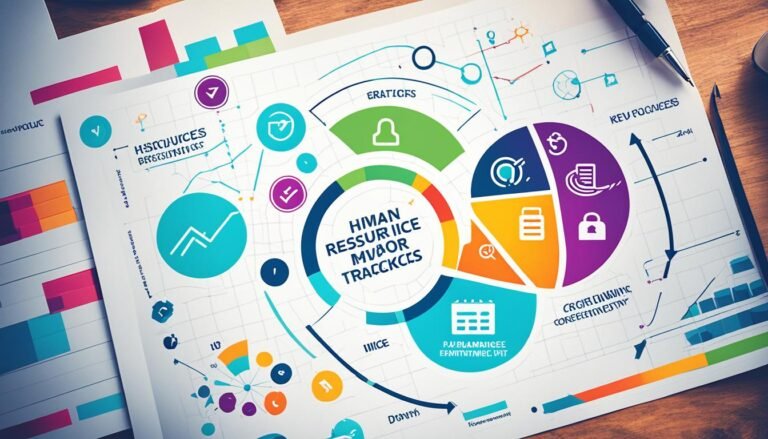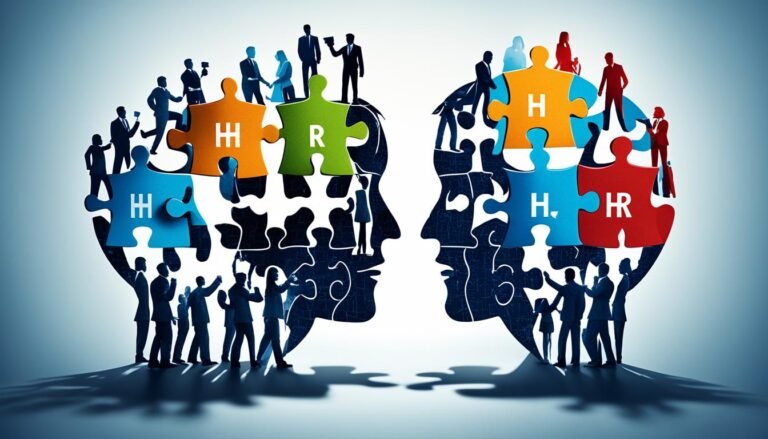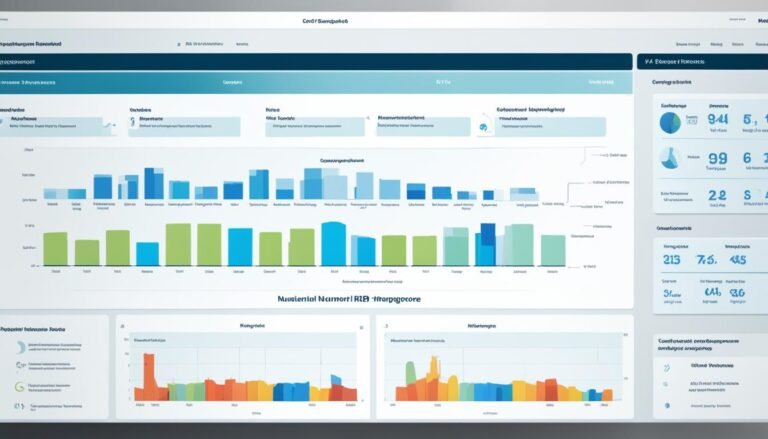A Guide to Human Resources Management Efficiency
Implementing an effective human resource management strategy can have a significant impact on the success of your business. By optimizing HR processes, streamlining operations, and enhancing productivity, you can create an efficient HR management system that leads to improved employee relations, higher retention rates, and increased overall performance.
Human resource management (HRM) is the practice of hiring, training, compensating, managing, and retaining employees within an organization. It involves not only the work of the HR department but also the responsibilities of team leaders and managers throughout the organization. HRM plays a crucial role in building and maintaining a talented and motivated workforce.
Efficient HR practices encompass various aspects such as hiring and onboarding, managing employee benefits and compensation, overseeing company policies, providing employee training and development opportunities, and implementing performance management strategies. Effective HR management also involves fostering a positive work environment and keeping employees motivated.
Investing in human resource management is vital for the success of any organization. Besides fulfilling staffing needs, HRM improves employee engagement, enhances brand reputation, and attracts top talent. It aligns organizational goals with a positive work culture and ensures compliance with employment laws.
If you aspire to pursue a career in HRM, there are numerous opportunities available. HR managers oversee staffing, make strategic decisions, and handle talent acquisition and management. Education and experience play a crucial role in building a successful HR management career, with degrees in HR or related fields and certifications from professional HR organizations being valuable assets.
This article will explore the intricacies of human resource management, including its importance, objectives, career opportunities, skills, and responsibilities of an HR manager, and the tools and software available to streamline HR processes. We will also delve into the current HRM trends and the steps to becoming a competent HR manager.
Follow along to enhance your understanding of human resources management efficiency and unlock the potential of your HR department.
Key Takeaways:
- Implementing effective HR processes can lead to improved employee relations and increased retention rates.
- HRM involves hiring, training, compensating, managing, and retaining employees.
- An efficient HR management system helps create a positive work environment and keeps employees motivated.
- Investing in HRM enhances brand reputation and attracts top talent.
- HR managers play a vital role in staffing, talent acquisition, and strategic decision-making.
What is Human Resource Management?
Human resource management (HRM) is the practice of hiring, training, compensating, managing, and retaining the employees of an organization. HRM is people management and covers all aspects of strategic planning, decision-making, and work involved in building and maintaining a team of employees. HRM is not limited to the HR department, as team leaders and managers also have responsibilities in HRM.
Effective human resource management is essential for organizations to create and maintain a cohesive and productive workforce. By strategically managing personnel, HR management ensures that the right people with the right skills are in the right roles. This involves recruiting talented individuals, training and developing their skills, compensating them fairly, and providing support throughout their employment.
HR management is responsible for several key functions that contribute to the success of an organization:
- Hiring: HR management oversees the recruitment and selection process to attract and identify candidates who are the best fit for the organization’s needs.
- Training and Development: HR management provides training programs and opportunities for employees to enhance their skills and knowledge, enabling them to perform their job duties effectively.
- Compensation: HR management ensures that employees are compensated fairly and in accordance with the organization’s policies and procedures.
- Employee Management: HR management handles employee relations, performance management, and conflict resolution within the organization.
- Retention: HR management implements strategies to retain top talent and create a positive work environment that encourages employee loyalty.
Human resource management is crucial for organizations as it enables them to effectively manage their most valuable asset – their employees. Whether it’s attracting and hiring top talent, developing their skills, providing fair compensation, or creating a positive work culture, HR management plays a vital role in driving organizational success.
“Effective HR management is crucial for organizations to attract, retain, and develop top talent while creating a positive work environment.”
How Does Human Resource Management Work?
Human resource management (HRM) is a multifaceted process that encompasses various functions, involving HR professionals, team leaders, and managers. It is a comprehensive approach to managing employees throughout their employment lifecycle, from hiring to retirement.
Let’s explore the key components of HRM:
Hiring and Onboarding
Hiring is a critical aspect of HRM, where HR professionals and hiring managers collaborate to attract top talent for open positions. This process involves job postings, resume screening, interviewing, and making the final selection. Once candidates are hired, smooth onboarding ensures a seamless transition into their roles.
Managing Employee Benefits and Compensation
HR professionals play a vital role in managing employee benefits and compensation. They ensure employees are offered competitive salary packages, benefits like healthcare, retirement plans, and other perks to attract and retain valuable talent.
Overseeing Company Policies
HRM involves developing and implementing company policies that promote fair and ethical practices within the organization. HR professionals ensure compliance with employment laws and regulations, creating a safe and inclusive work environment for all employees.
Employee Training and Professional Development
HRM includes employee training and development programs to enhance skills, improve performance, and cultivate a culture of continuous learning. HR professionals collaborate with managers to identify training needs and provide resources for professional growth.
Performance Management
Performance management is a crucial function of HRM that involves setting goals, providing feedback, and evaluating employee performance. HR professionals work closely with managers to establish performance metrics and implement effective performance review processes.
Employee Motivation
HRM aims to keep employees motivated and engaged by fostering a positive work culture. HR professionals organize employee recognition programs, incentive schemes, and create opportunities for career growth to inspire employees to perform at their best.
HRM is a multi-faceted discipline that requires collaboration between HR professionals, team leaders, and managers to optimize the organization’s most valuable asset – its employees. By effectively managing various HR functions, companies can create a nurturing and productive work environment that drives success.
| Components of HRM | Roles and Responsibilities |
|---|---|
| Hiring and Onboarding | HR professionals collaborate with hiring managers to attract and select top talent, ensuring a seamless onboarding experience. |
| Managing Employee Benefits and Compensation | HR professionals oversee employee benefits and compensation packages, ensuring competitive and fair arrangements. |
| Overseeing Company Policies | HR professionals develop and enforce company policies, fostering a safe and inclusive work environment. |
| Employee Training and Professional Development | HR professionals facilitate employee training and development programs, promoting skill enhancement and career growth. |
| Performance Management | HR professionals collaborate with managers to establish performance metrics, provide feedback, and conduct performance reviews. |
| Employee Motivation | HR professionals create initiatives to motivate and engage employees, promoting a positive work culture. |
The Importance of Human Resource Management
Human resource management (HRM) plays a critical role in the success of any organization. It goes beyond simply hiring and managing employees; HRM is essential for enhancing the employee experience, improving brand reputation, and attracting top talent. By implementing a well-developed HRM strategy, companies can foster employee engagement, reflect their core values, and create a positive work environment.
Employee engagement is a key factor in HRM. Engaged employees are more committed to their work, resulting in increased productivity, higher levels of customer satisfaction, and improved overall organizational performance. HRM practices that focus on employee engagement involve regular communication, recognition and rewards programs, and opportunities for professional development.
In addition to employee engagement, effective HRM also contributes to the company’s brand reputation. A positive and supportive work environment, coupled with strong HR practices, attracts job seekers. Candidates are more likely to apply to companies that have a reputation for prioritizing employee well-being and growth. A favorable brand reputation not only helps in attracting top talent but also contributes to customer loyalty and financial performance.
“A positive and supportive work environment, coupled with strong HR practices, attracts job seekers.”
Attracting top talent is a continuous challenge for organizations. With HRM strategies in place, companies can differentiate themselves from competitors and create a compelling employer brand. A well-defined employer brand communicates the organization’s mission, values, and culture, making it easier to attract and retain top performers. HRM practices focused on attracting top talent include competitive compensation packages, comprehensive benefits, flexible work arrangements, and opportunities for career growth.
Efficient HR management is critical for the success and growth of any organization. The impact of strategic HRM practices extends beyond managing employees; it affects the overall performance and sustainability of the business. By prioritizing human resource management, companies can create a workplace that nurtures employee satisfaction, strong brand reputation, and continued success in attracting and retaining top talent.
| Benefits of Effective HR Management | Key Factors |
|---|---|
| Enhanced Employee Engagement | Regular communication, recognition programs, professional development opportunities |
| Improved Brand Reputation | Positive work environment, strong HR practices |
| Attracting Top Talent | Competitive compensation, comprehensive benefits, flexible work arrangements, opportunities for career growth |
Objectives of Human Resource Management
The main goal of human resource management (HRM) is to fulfill staffing needs while creating a positive work environment. HRM aims to optimize organizational behavior, achieve organizational goals, and create a positive work culture conducive to employee empowerment, training and development, and retention. Additionally, HRM plays a crucial role in ensuring compliance with employment law.
By focusing on these objectives, HRM contributes to the overall success of an organization, fostering a productive and engaged workforce.
Optimizing Organizational Behavior
One objective of HRM is to optimize organizational behavior by establishing policies, procedures, and practices that promote positive employee attitudes and behaviors. HRM initiatives, such as implementing effective communication channels, promoting teamwork, and fostering a sense of belonging, contribute to a harmonious work culture and improve overall organizational performance.
Achieving Organizational Goals
HRM aligns employee efforts with the organization’s goals and objectives. By effectively managing talent acquisition, development, and retention, HRM ensures that the right people are in the right positions to drive the success of the organization. Through strategic workforce planning, HRM helps organizations achieve their long-term goals and adapt to changing business environments.
Creating a Positive Work Culture
A positive work culture is crucial for employee engagement, satisfaction, and productivity. HRM plays a key role in shaping and maintaining a positive work culture by fostering a supportive and inclusive environment. This includes promoting diversity and inclusion, recognizing and rewarding employee achievements, and encouraging work-life balance.
Implementing Training and Development
Employee training and development are essential for enhancing skills, knowledge, and performance. HRM designs and implements training programs to address skill gaps, improve employee capabilities, and support career growth. Through continuous learning initiatives, HRM ensures that employees are equipped with the necessary competencies to contribute effectively to the organization’s success.
Supporting Employee Empowerment
HRM empowers employees by providing them with opportunities for decision-making, autonomy, and self-development. By fostering a culture of empowerment, HRM enables employees to take ownership of their work, innovate, and contribute to the achievement of organizational objectives. This leads to higher job satisfaction, motivation, and higher levels of organizational commitment.
Improving Retention
Retaining top talent is crucial for organizational success. HRM focuses on creating an environment that attracts and retains skilled employees through competitive compensation and benefits packages, career development opportunities, and supportive leadership. By implementing effective retention strategies, organizations can reduce turnover, retain institutional knowledge, and promote stability and continuity.
Complying with Employment Law
Employment law governs the rights and obligations of employees and employers. HRM is responsible for ensuring compliance with relevant legislation and regulations to protect the rights and well-being of employees and the organization. This includes adhering to fair employment practices, implementing workplace safety measures, and staying updated on changes in employment law.
HRM Career Opportunities and Requirements
If you are organized, detail-oriented, enjoy helping others, and find satisfaction in coordinating solutions to administrative and personal problems, a career in Human Resource Management (HRM) may be the right path for you. HRM offers a wide range of career opportunities that allow you to make a significant impact on an organization’s success.
Almost every industry requires HR professionals to manage their workforce effectively. From recruitment and talent acquisition to employee training and performance management, HRM plays a crucial role in building and maintaining a productive and engaged workforce.
HR Careers
HR careers can span across various roles, including:
- HR Coordinator
- Recruiter
- Training and Development Specialist
- Compensation and Benefits Analyst
- HR Generalist
- Employee Relations Manager
- HR Manager
These positions offer different levels of responsibility and opportunities for growth within the field of HRM. Depending on your interests and ambitions, you can choose a career path that aligns with your goals.
Requirements
Entry-level HR positions typically require a bachelor’s degree in Human Resources or a related field. However, leadership or management positions may require advanced degrees such as an MBA or a master’s degree in Human Resources or Organizational Development.
Additionally, HR professionals can enhance their qualifications and demonstrate their expertise by obtaining certifications from reputable organizations such as the Society for Human Resource Management (SHRM) or the Human Resources Certification Institute (HRCI).
| Position | Education | Certifications |
|---|---|---|
| HR Coordinator/Recruiter | Bachelor’s Degree in HR or related field | SHRM-CP or PHR |
| HR Generalist/Employee Relations Manager | Bachelor’s Degree in HR or related field | SHRM-CP or PHR |
| HR Manager | Master’s Degree in HR or related field | SHRM-SCP or SPHR |
The certifications from SHRM and HRCI, such as Certified Professional (CP) and Senior Certified Professional (SCP), or Professional in Human Resources (PHR) and Senior Professional in Human Resources (SPHR), respectively, provide recognition of your expertise and can significantly enhance your employment prospects in the HR field.
By attaining the necessary qualifications and certifications, and gaining practical experience through internships or entry-level positions, you can pave the way for a successful career in Human Resource Management.
What is the Difference Between HR and HRM?
Human resources (HR) and human resource management (HRM) are terms that are often used interchangeably, but they actually refer to different aspects of managing employees within an organization.
Human resources is the department that deals with tasks and resources associated with hiring, compensation, and administration of employees. It focuses on the operational aspects of managing personnel and ensuring compliance with labor laws and company policies.
Human resource management, on the other hand, is the practice of implementing principles of management to effectively organize and optimize employees of an organization. It goes beyond the administrative tasks and involves strategic planning, talent acquisition, talent development, and employee engagement. HRM aims to align the human resources with the organizational goals and unlock their full potential.
While HR focuses on administrative functions such as maintaining employee records, overseeing payroll, and managing benefits, HRM takes a broader view and emphasizes the development and utilization of human capital for the achievement of organizational objectives. HRM encompasses recruitment and selection, training and development, performance management, compensation and rewards, employee relations, and fostering a positive work culture.
In summary, HR is a department that deals with the day-to-day tasks and operations related to employees, while HRM is a strategic approach that aims to maximize the value of human resources through implementing management principles.
Skills and Responsibilities of an HR Manager
HR managers play a vital role in organizations by overseeing staffing and collaborating with executives to make strategic decisions. They have a diverse range of responsibilities that encompass various aspects of talent management and compliance with labor laws and regulations.
Talent Acquisition
One of the key responsibilities of an HR manager is talent acquisition. They are responsible for developing and implementing effective recruitment strategies to attract top talent. This involves creating job postings, conducting interviews, and evaluating candidates to select the best fit for the organization.
Talent Management
In addition to recruitment, HR managers are also responsible for aligning talent management with organizational objectives. They develop and implement programs for employee training and professional development, ensuring that employees have the necessary skills to contribute to the success of the organization.
HR Department Management
Managing the daily workflow of the HR department falls under the purview of an HR manager. They oversee the work of HR staff, delegating tasks and ensuring that operations run smoothly. They also analyze compensation trends, monitor employee performance, and handle disciplinary issues when necessary.
Compliance with Labor Laws and Regulations
HR managers have the responsibility to ensure that the organization complies with labor laws and regulations. They stay up-to-date on changes in labor laws, implement necessary changes to company policies, and handle any legal issues that may arise.
Effective Communication
Communication skills are essential for HR managers as they interact with employees, executives, and external stakeholders. They serve as a bridge between management and employees, effectively conveying information, resolving conflicts, and promoting a positive work environment.
HR Manager Skills and Responsibilities
| Skills | Responsibilities |
|---|---|
| Recruitment | Talent acquisition |
| Training and Development | Aligning talent management with organizational objectives |
| Workflow Management | Managing the daily operations of the HR department |
| Compliance | Ensuring compliance with labor laws and regulations |
| Communication | Effectively communicating with employees and executives |
By possessing a combination of these skills and carrying out these responsibilities, HR managers contribute to the success of an organization by creating a positive work environment, ensuring compliance, and effectively managing human resources.
How to Become a Human Resources Manager
Starting a career as a Human Resources Manager often requires a bachelor’s degree in Human Resources or a related field. In addition to the educational qualification, prior professional experience in a human resource management position is beneficial for aspiring HR managers.
To pursue a career as an HR manager, it is advisable to obtain a degree in Human Resources or a related field. This educational background provides a solid foundation in HR principles and practices.
Furthermore, previous experience as an HR manager or HR executive is highly valued. Hands-on experience in managing HR processes, such as recruitment, onboarding, employee relations, and performance management, showcases practical knowledge and skills in the field.
Familiarity with HR systems and labor law is essential for HR managers. Proficiency in HR software and technology enables effective management and analysis of HR data and processes. Understanding labor law ensures compliance with legal regulations and mitigates potential risks.
Excellent communication and interpersonal skills are fundamental for success as an HR manager. The ability to effectively communicate with employees, executives, and stakeholders is crucial. Strong interpersonal skills facilitate relationship building, conflict resolution, and employee engagement initiatives.
“The HR manager must effectively communicate and translate the organization’s mission and vision into actionable HR strategies.”
Becoming a Human Resources Manager requires a combination of education, professional experience, skills, and personal qualities. Investing in continuous professional development and staying updated with industry trends and best practices can further enhance one’s career prospects in HR management.
Key Skills and Requirements for HR Managers:
- Strong knowledge of HR principles, practices, and regulations
- Exceptional communication and interpersonal skills
- Proficiency in HR systems and software
- Ability to analyze data and make informed HR decisions
- Effective problem-solving and decision-making abilities
- Leadership skills and the ability to influence others
- Excellent organizational and time management skills
Becoming a Human Resources Manager offers a rewarding career path for individuals interested in managing and developing talent, fostering a positive work culture, and contributing to overall organizational success. With the right combination of education, professional experience, and skills, aspiring HR managers can thrive in this dynamic and essential role.
HRM Tools & Software
Human Resource Management (HRM) encompasses a wide range of positions and objectives within an organization. To streamline HR processes and optimize efficiency, various tools and software solutions are available in the market. These tools help HR professionals effectively manage different aspects of HRM, including applicant tracking, onboarding, payroll, and performance management.
One popular tool used in HRM is the Human Resources Information System (HRIS). An HRIS is a comprehensive software solution that enables HR departments to store, manage, and analyze employee information efficiently. With an HRIS, organizations can automate and streamline tasks such as applicant tracking, onboarding processes, payroll management, and performance management, leading to increased productivity and accuracy.
Another type of software commonly used in HRM is Human Management Resource Systems (HMRS). HMRS offers similar functions as an HRIS but also provides additional features for performance monitoring and engagement tracking. These systems help HR professionals measure and evaluate employee performance, identify areas for improvement, and create personalized development plans.
By leveraging HRM tools and software, organizations can significantly enhance their HR processes, increase operational efficiency, and improve overall workforce management. These tools facilitate data-driven decision-making, enable seamless collaboration between HR departments and other stakeholders, and ultimately contribute to the achievement of organizational goals.
Benefits of HRM Tools and Software:
- Streamline HR processes and reduce manual paperwork
- Enhance accuracy and efficiency in applicant tracking, onboarding, and payroll management
- Improve performance management through data-driven insights and monitoring
- Automate routine tasks, allowing HR professionals to focus on strategic initiatives
- Ensure compliance with legal and regulatory requirements
- Promote employee engagement and development through personalized tracking and analysis
Types of HRM Tools and Software:
| Name | Description |
|---|---|
| Applicant Tracking Systems | Simplify the recruitment process by managing job postings, applications, and candidate evaluations. |
| Onboarding Software | Facilitate the smooth integration of new hires into the organization through automated workflows and task management. |
| Payroll Software | Ensure timely and accurate salary processing while managing tax obligations and compliance requirements. |
| Performance Management Systems | Track and evaluate employee performance, set goals, provide feedback, and manage performance reviews. |
Challenges in Implementing HRM Tools and Software:
“While HRM tools and software offer numerous benefits, there may be challenges in their implementation. Organizations must ensure effective integration of these tools with existing systems and processes. Additionally, comprehensive training and ongoing support are essential to maximize the potential of HRM tools and software. Close coordination with IT professionals and vendor partnerships can help overcome these challenges and unlock the full potential of HRM technology.”
In conclusion, HRM tools and software play a critical role in optimizing HR processes and improving the overall efficiency of human resource management. By leveraging HRIS and HMRS solutions, organizations can automate routine HR tasks, improve data accuracy, and foster a more engaged and productive workforce. For a more integrated approach, utilizing an HR automation platform can further streamline these processes and enhance overall HR operations.
Human Resource Management Trends
The field of Human Resource Management (HRM) is constantly evolving, and staying up to date with the latest trends is crucial for businesses to attract and retain top talent. In this section, we will explore the current HRM trends that focus on employee benefits, work/life balance, company culture, and the overall employee experience.
One of the key HRM trends is the emphasis on employee benefits. Companies are recognizing the importance of offering competitive benefits packages to attract and retain top talent. This includes comprehensive healthcare plans, retirement savings options, flexible spending accounts, and wellness programs. By providing attractive benefits, employers can demonstrate their commitment to employee well-being and create a positive work environment.
Work/life balance is another significant trend in HRM. With the increasing demand for flexibility, companies are implementing policies that allow employees to better manage their personal and professional lives. Flexible working hours, remote work opportunities, and compressed workweeks are becoming more common. These practices not only help employees achieve a better work/life balance but also contribute to increased productivity and job satisfaction.
Company culture plays a crucial role in HRM trends. Organizations are recognizing that a strong and positive company culture attracts and retains employees. They are actively fostering a work environment where employees feel included, valued, and supported. This includes promoting diversity and inclusion, providing opportunities for professional development, and implementing recognition and reward programs to motivate and engage employees.
Employee experience is another focus area in HRM trends. Companies are prioritizing the overall experience that employees have throughout their employment journey. This includes everything from the recruitment process to onboarding, training, and ongoing development opportunities. Creating a seamless and positive employee experience not only boosts morale but also improves productivity and employee retention.
In response to the changing work landscape, remote work has become a prominent trend in HRM. With advancements in technology, companies are realizing the benefits of remote work options. This allows employees to work from anywhere, eliminating geographical limitations and increasing access to top talent. Organizations are implementing remote work policies and providing the necessary tools and support to ensure productivity and collaboration.
Quote: “The future of HR is no longer in filling positions, but in creating a work environment where employees feel valued, supported, and empowered.” – [Author Name]
Another significant HRM trend is the concept of unlimited paid time off (PTO). Companies are shifting away from traditional leave policies and adopting unlimited PTO programs. This empowers employees to take time off when needed, promoting work/life balance and trust within the organization. By giving employees more control over their time, companies can improve productivity and job satisfaction.
Comparison of HRM Trends
| Trend | Description | Benefits |
|---|---|---|
| Employee Benefits | Comprehensive healthcare, retirement plans, wellness programs | Attract and retain top talent, demonstrate commitment to employee well-being |
| Work/Life Balance | Flexible working hours, remote work options, compressed workweeks | Increased productivity, improved job satisfaction |
| Company Culture | Diversity and inclusion, professional development, recognition programs | Attract and retain employees, boost morale |
| Employee Experience | Seamless recruitment, onboarding, training, and development | Improved productivity, increased employee retention |
| Remote Work | Opportunities to work from anywhere, increased access to top talent | Flexible work arrangements, improved collaboration |
| Unlimited PTO | Allow employees to take time off when needed | Enhanced work/life balance, increased trust and autonomy |
Conclusion
Prioritizing human resources management efficiency is crucial for businesses of all sizes. By optimizing HR processes, improving HR efficiency, and streamlining HR operations, organizations can enhance HR productivity and maximize HR management. Effective HR practices are key to increasing overall efficiency and ensuring effective HR management.
Implementing efficient HR strategies has several benefits. It not only improves employee satisfaction and retention, but also attracts top talent to the organization. When HR processes are optimized, businesses can streamline operations, eliminate bottlenecks, and enhance overall productivity. The resulting efficient work culture promotes collaboration, communication, and innovation, ultimately leading to better organizational performance.
To achieve human resources management efficiency, organizations should invest in tools, software, and technologies that automate and streamline HR processes. By leveraging HRIS (Human Resources Information Systems) and other HRM software, businesses can effectively manage recruitment, onboarding, talent development, performance management, and employee engagement. These tools provide real-time access to data, improve decision-making, and facilitate efficient communication across the entire organization.
In summary, efficient HR practices, optimizing HR processes, and improving HR efficiency are critical for organizations looking to enhance their HR management capabilities. By investing in HR management, businesses can unlock the full potential of their workforce, drive employee engagement, and achieve higher levels of overall organizational efficiency.







